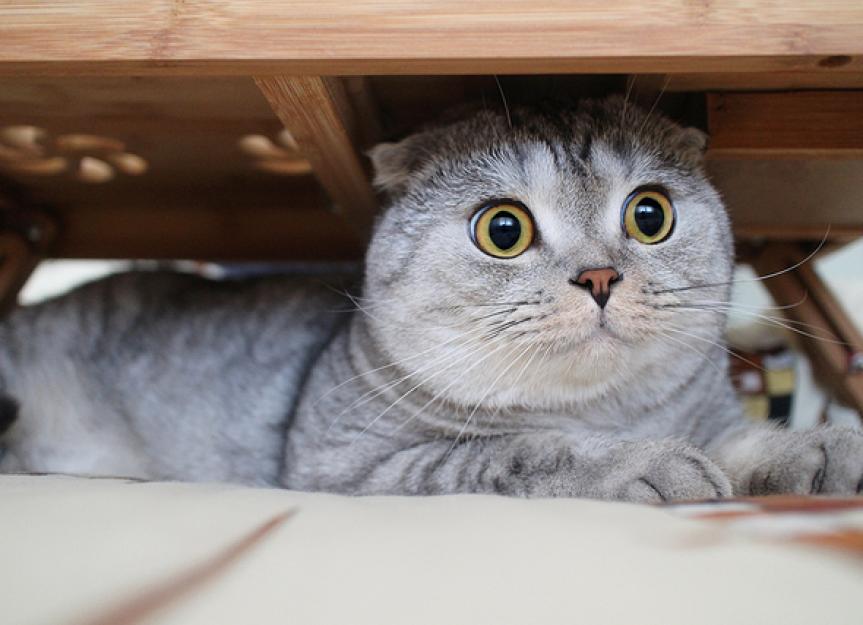5 Ways to Help a Hiding Cat
By John Gilpatrick
It’s hard to say if Garfield started the stereotype of the mischievous, anti-social cat, but he certainly reinforced it, and to be fair, there’s some basis in truth.
虽然有些猫基于“增大化现实”技术e friendly and cuddly, many others spend their days in dark enclosed spaces and prowl the house at night.
“A lot of cats lead nocturnal lives,” says Myrna Milani, DVM, an author and veterinary scholar in the fields of pathology and anthrozoology.
If your cat usually spends its day hidden, that’s generally fine and normal, Milani says. The problem arises, however, when social cats suddenly start hiding. This behavior is often indicative of stress, fear, a medical issue, or some combination of these.
Continue reading for tips on identifying problematic forms of hiding behavior in cats and what you can do to resolve the underlying issue.
Allow Your Cat to Warm Up to Visitors
One of the primary causes of stress in cats is a change in their environments, and one big change that often induces hiding is the addition of a new person to the household.
Whether this is in the form of a temporary visitor or a permanent resident, cats are naturally inclined to assume a new person is a threat to their territory. (The same goes for the addition to a new animal.) As such, you might find your feline hiding or marking areas with her scent.
Milani says it’s important to give a cat time to adjust to the change and accept the new person on her own terms. “The worst thing you can tell the new person to do is play nice and ‘kissy face’ with the cat,” she says.
Instead, short-term visitors can sit near the hiding spot and let the cat come to them, maybe coaxing her out with a treat or a toy that will boost her confidence and make her feel more like predator than prey.
Milani suggests longer-term visitors or new permanent residents rub themselves all over with a dry towel or washcloth. Then, leave the towel in the middle of the floor overnight and allow the cat to explore the scent on her own time and at her own speed.
The cat should start feeling more comfortable the next day, though if the towel has been peed on, “That’s a message, and you need to keep being patient,” Milani says.
Try to Normalize a New Environment
Another cause of this type of stress is a move. It might take your cat a while to adjust to the new house, and that’s made worse, Milani says, the more you change things around. Trying to give your cat normalcy in a new house—whether that’s setting up her cat tree by a window or avoiding clutter with empty boxes—will help your cat adjust.
“I know it’s not what people who move want to hear, but the best thing you can do for a cat after a move is to unpack everything and settle in as quickly as possible,” she says.
Give Your Cat a Safe Space
It’s not uncommon for cats to be fearful of visitors or changes in their environments or routines. Fear in cats is often marked by prey behavior, which includes running away and hiding.
Dilara G. Parry, a certified cat behavior consultant, says “safe spaces” are an easy way for the owner to make sure that the hiding that’s taking place is healthy and safe.
“A sturdy cardboard box, turned on its side with a nice blanket placed inside, can be an alluring hiding space that is safe,” Parry says.
米拉尼补充说,削减这种洞了side-down cardboard box is another great DIY safe space because the cat can face the opening and know nothing is coming up behind her.
Monitor Your Cat’s Behavior Changes
Hiding behavior in cats could signal an illness or serious medical condition, and owners need to pay attention when this behavior emerges and is out of the ordinary.
Milani says if a cat begins hiding, it’s paramount that the owner monitors the cat’s eating, drinking, urinating, and defecating. She recommends blocking off the bathroom to the cat and marking his water dish with a marker so you know exactly how much water is being consumed every day.
Other easily observable signs of an illness or condition that’s forcing hiding are discharge from the eyes or nose, limping, and non-specific diarrhea.
Make an Appointment With Your Vet
If your cat is suddenly hiding, and seems more antisocial than normal, a visit to the veterinarian is recommended to rule out any medical issues. After all, it’s better to be safe than sorry.
“Sometimes, the first indication to the guardian that their cat is sick is hiding behavior,” Parry says. “I have seen this in cases of urinary blockage, which can quickly turn fatal if untreated, so I definitely urge guardians to take hiding behavior seriously, especially if it is not ‘par for the course’ for that particular cat.”

